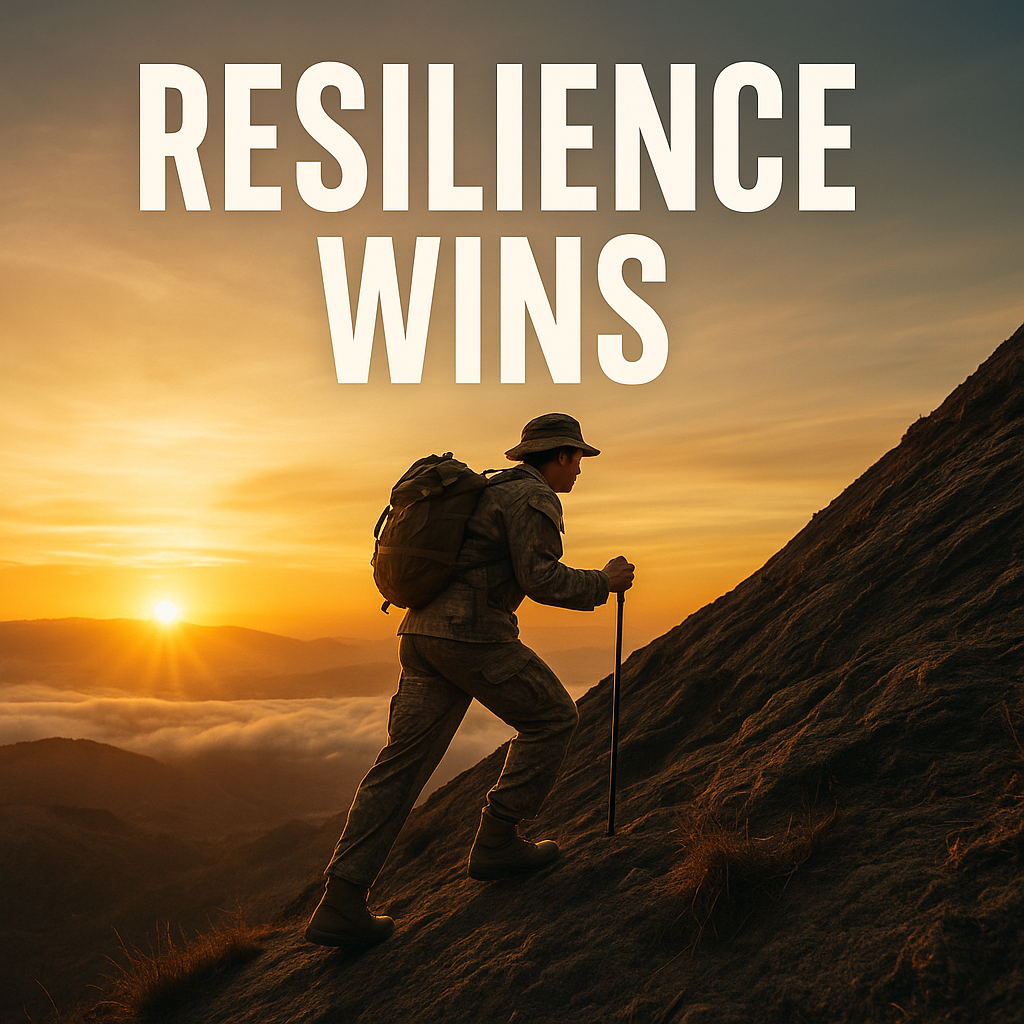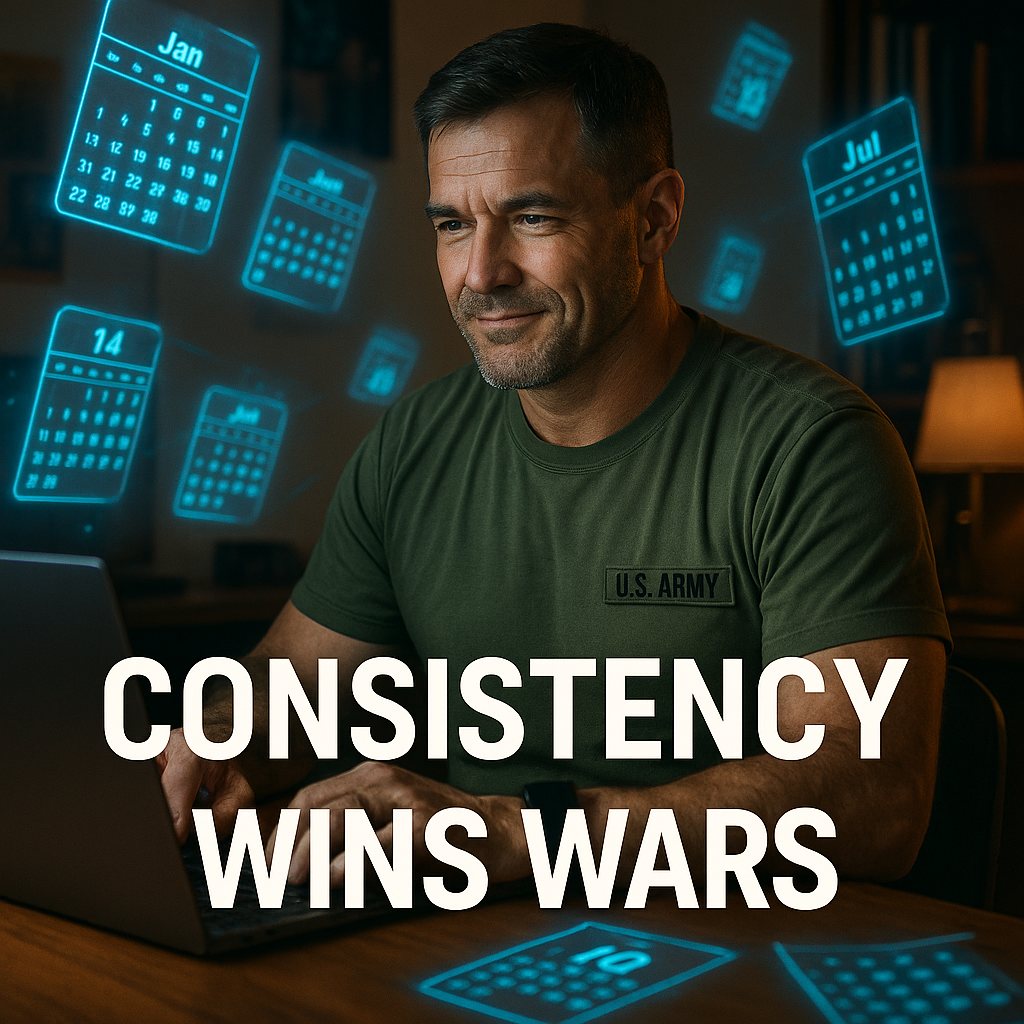A few years back, I poured my hard-earned savings into a business ad campaign that fizzled spectacularly. It was a punch to the gut—much like that first week at boot camp when everything felt impossible. But looking back, both moments taught me the same lesson: real grit isn’t about avoiding failure—it’s about refusing to stay down. Veterans, more than anyone, get this. We don’t just bounce back; we rebound with a vengeance. Let’s unpack how this mindset turns setbacks into the ultimate launchpad for entrepreneurial success.
The Not-So-Secret Weapon: What Military Experience Taught Me About Bouncing Back
When people ask me what sets veteran entrepreneurs apart, I always come back to one word: resilience. But here’s the thing—resilience isn’t just something you’re born with. It’s forged through experience, and for veterans, that experience comes from military training that’s as much mental as it is physical. Military experience is the not-so-secret weapon that gives us an edge in entrepreneurial resilience and adaptability.
Military Training: A Crash Course in Chaos
Military training isn’t just about push-ups and obstacle courses. It’s a crash course in adapting when chaos reigns. You learn quickly that plans rarely survive first contact—whether that’s with the enemy or with a surprise market downturn. In the field, we were taught to assess, adapt, and act—sometimes in a matter of seconds. That same skill set is what helps veteran entrepreneurs pivot when a product launch flops or a key client walks away.
Resourcefulness Under Pressure
Let me share a quick story. During a deployment, my squad once had to improvise shelter with nothing but parachute fabric and grit. We were cold, tired, and running low on supplies. But giving up wasn’t an option. We pooled our ideas, got creative, and made it work. That resourcefulness is exactly what kicks in when your marketing budget evaporates overnight or your business faces an unexpected setback. Veteran entrepreneurship is built on the ability to adapt and overcome, no matter the circumstances.
Adapting Under Stress: In Our DNA
Veterans have ‘adapting under stress’ built into their DNA. In the military, stress management isn’t just a buzzword—it’s a survival skill. We learned to keep calm under fire, make decisions with limited information, and lead teams through uncertainty. These are the same skills that drive business resilience and keep companies afloat when times get tough.
‘Veterans enter the business world with a toolbox forged in fire—adapt, persevere, improvise.’ – John C. Maxwell
Translating Military Experience to Business Success
What does all this mean for veteran entrepreneurship? It means we come equipped with a mindset that sees setbacks as stepping stones, not roadblocks. Military experience translates into core entrepreneurial skills like:
- Adaptability and Resilience: Adjusting to new challenges on the fly.
- Perseverance: Pushing through adversity when others might quit.
- Rapid Problem-Solving: Finding solutions with limited resources.
- Team-Building: Rallying people around a common mission, even in tough times.
Research shows that veterans leverage military leadership and resilience skills to succeed in entrepreneurship. We’re trained to endure pressure, adapt under stress, and keep going when others quit. That mindset is invaluable in business, especially when the unexpected happens.
In the end, military experience isn’t just a line on a resume—it’s a living, breathing advantage in the world of business. It’s the not-so-secret weapon that helps us bounce back, stronger every time.
Four Outrageously Practical Tactics for Building Business Resilience (From Someone Who’s Tried Them All)
If there’s one thing military life taught me, it’s that resilience isn’t a theory—it’s a muscle you build by getting knocked down and getting back up, again and again. In business, setbacks are guaranteed. But how you respond? That’s where the real growth happens. Here are four battle-tested tactics for building business resilience—each one forged in the fire of real-world experience, not just textbooks.
1. Reframe Failure as Tuition, Not Defeat
Every entrepreneur faces failure. The trick is to treat each mistake as a class you’ve paid for, not a defeat to dwell on. When I lost thousands on a failed ad campaign, it stung. But instead of quitting, I asked: What did I just pay to learn? That shift in mindset—reframing failure as feedback—turned a painful loss into a powerful lesson. Remember:
‘It’s not the setback—it’s the setup for your next comeback.’ – Brene BrownIf you’re willing to pay attention, every misstep is a stepping stone to smarter decisions.
2. Focus Only on What’s Within Your Control
In the military, we learned to focus on the mission, not the chaos around us. The same goes for business. You can’t control market swings, global events, or what your competitors do. But you can control your actions, your attitude, and your response. When things go sideways, I ask myself: What’s in my control right now? Then I double down on those things. Worrying about the rest is wasted energy. Overcoming setbacks starts with channeling your focus where it actually counts.
3. Find Your Crew—Support Networks Are Everything
One of the biggest lessons from my military days: You never go it alone. In business, your support network is more than a LinkedIn circle—it’s your lifeline. I’ve leaned on fellow veterans, mentors, and even competitors for advice and encouragement. When you surround yourself with people who understand the grind, you stay grounded and get honest feedback. Building business resilience isn’t a solo mission. Find your crew, lean on them, and be there when they need you too.
4. Remember Your Mission—Stay Driven When It Gets Tough
Every entrepreneur hits rough patches—profits dip, critics get loud, and doubts creep in. That’s when I go back to my ‘why.’ Why did I start this business? Who am I helping? What’s the bigger mission? Staying mission-driven keeps you moving forward when motivation runs dry. It’s the anchor that holds you steady in the storm. Building business resilience means keeping your eyes on the long game, not just the daily grind.
- Reframe failure: Every mistake is a class—if you’re willing to pay attention.
- Control what you can: Focus energy on actions, not circumstances.
- Find your crew: A veteran’s network is a lifeline, not just a contact list.
- Remember your mission: When things get tough, recall your ‘why.’
These aren’t just theories—they’re tactics I’ve lived. If you want to build true business resilience, start here.
Why Veteran-Led Startups Are Harder to Shake Than a Bad Habit
There’s a reason you see so many veteran-led startups not just launching, but sticking around long after others have folded. I’ve seen it firsthand—veteran entrepreneurs have a way of digging in, adapting, and refusing to let go, even when the going gets tough. Maybe it’s stubbornness, maybe it’s strategy, but the numbers don’t lie: veteran-run businesses are statistically more likely to survive past the five-year mark compared to their non-veteran peers.
Support Networks Built on Camaraderie
One of the biggest advantages veteran-led startups have is the power of support networks. In the military, we learned to trust the person next to us with our lives. That bond doesn’t disappear when we hang up the uniform—it transforms into a business support system you can actually call at midnight. I can’t count how many times I’ve reached out to a fellow vet for advice, a pep talk, or even a late-night brainstorm session. These networks aren’t just about swapping war stories; they’re about sharing resources, connections, and real solutions to business challenges.
Research backs this up: veteran entrepreneurs who tap into their military networks for emotional, moral, and business support are more resilient and more likely to succeed. It’s not just about having someone to talk to—it’s about having someone who gets it, who’s been through the fire, and who’s willing to help you find your way out.
Turning Setbacks Into Drills
In the military, every setback is a lesson. We don’t just move on; we review what happened, adjust our tactics, and execute better next time. That mindset is gold in business. When a product launch flops or a deal falls through, I treat it like a drill: What went wrong? What can I fix? How do I make sure it doesn’t happen again?
This approach to overcoming setbacks is second nature for veterans. We’re trained to adapt under pressure and keep moving forward, no matter how many times we get knocked down. It’s not about avoiding failure—it’s about learning from it, fast. That’s why veteran-led startups are so hard to shake. We don’t see setbacks as the end; we see them as the next step in the mission.
Ongoing Learning and Mentorship
Another reason veteran-led startups have staying power is our commitment to ongoing learning. In the service, training never stops. That carries over into business, where we’re always seeking out new skills, mentors, and opportunities to grow. I’ve found that the best veteran entrepreneurs are also the most curious—they’re constantly asking questions, seeking feedback, and looking for ways to improve.
Mentorship is huge in the veteran community. Whether it’s formal programs or informal coffee chats, we lean on those who’ve gone before us. That willingness to learn from others, combined with the grit to keep going, is a recipe for long-term business resilience.
“The same determination that kept us marching when our boots filled with rain now keeps our startups afloat.” – Sarah Kim, Navy veteran entrepreneur
Wild Card: The Resilience Roadmap (or Why My Biggest Loss Became My Greatest Advantage)
Quick confession: I once spent thousands of dollars on a marketing campaign that completely flopped. No clicks, no sales—just a sinking feeling in my gut and a much lighter bank account. At first, it felt like a total disaster. But looking back, that loss taught me more than any online course or business book ever could. It was the moment I realized that setbacks aren’t roadblocks—they’re stepping stones, especially for veteran entrepreneurs like us.
In the military, we’re trained to run “after action reviews” after every mission. We break down what went right, what went wrong, and how we can do better next time. That habit—debrief, improve, repeat—became my secret weapon in business. Instead of letting that failed campaign define me, I treated it like tuition. I studied every detail, asked for feedback, and pivoted my approach. The lessons I pulled from that loss became the foundation of my personal Resilience Roadmap.
Here’s the thing: business resilience isn’t about avoiding failure. It’s about how you respond when things don’t go as planned. Veteran entrepreneurs are uniquely equipped for this. Our training taught us to adapt under pressure, to keep moving forward when others freeze, and to see every setback as a chance to get stronger. That mindset is what turns losses into lessons—and lessons into future wins.
One of the most unexpected gifts of resilience is the community it creates. When I started sharing my story—failures and all—I found that other veterans and entrepreneurs opened up too. Suddenly, the journey didn’t feel so lonely. We swapped stories, shared strategies, and celebrated each other’s comebacks. Inviting others into your resilience journey doesn’t just make the path less lonely; it makes it a lot more fun, and a lot more powerful.
Your worst flop might just be the prologue to your best chapter.
– Me, after yet another failed pitch
If you’re facing a setback right now, remember: it’s not the end of your story. It’s the beginning of your next breakthrough. The Resilience Roadmap isn’t just about bouncing back—it’s about bouncing forward, stronger and smarter than before. Every loss holds a lesson, and every lesson is a stepping stone to something greater. That’s the real advantage veteran entrepreneurs bring to the table: the ability to turn adversity into unstoppable growth.
So, if you’re ready to transform your setbacks into stepping stones, you’re in good company. Join me and other veterans who are building business resilience, one lesson at a time. Subscribe for more veteran-focused business insights, and if you want my personal Resilience Roadmap, DM me “RESILIENT.” Let’s turn your biggest losses into your greatest advantages—together.
TL;DR: Veteran entrepreneurs make challenges their training ground. The secret? Resilience—not the absence of failure, but the ability to get up, learn, and adapt, over and over. That’s what drives veteran-driven business growth.



